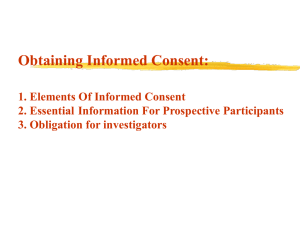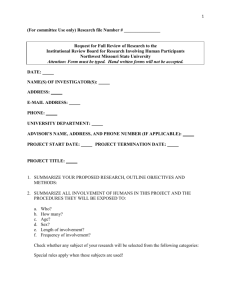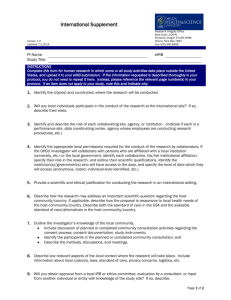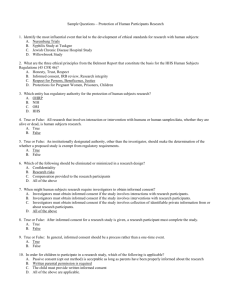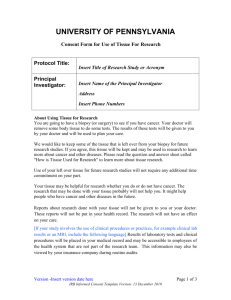Institutional Review Board
advertisement
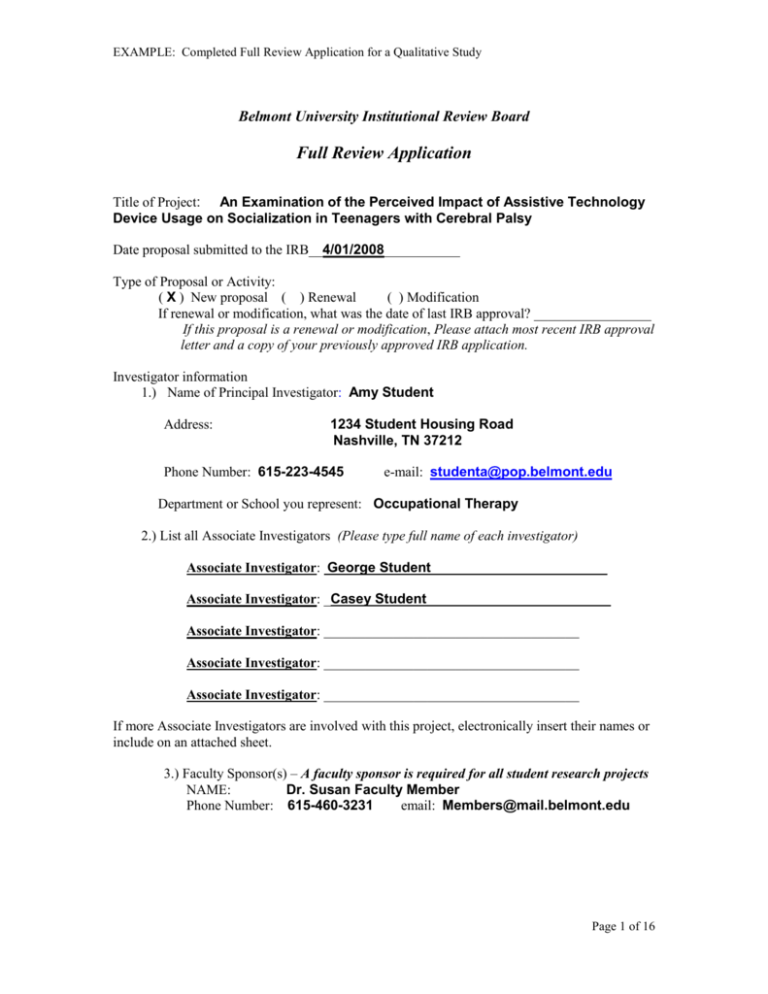
EXAMPLE: Completed Full Review Application for a Qualitative Study Belmont University Institutional Review Board Full Review Application Title of Project: An Examination of the Perceived Impact of Assistive Technology Device Usage on Socialization in Teenagers with Cerebral Palsy Date proposal submitted to the IRB__4/01/2008___________ Type of Proposal or Activity: ( X ) New proposal ( ) Renewal ( ) Modification If renewal or modification, what was the date of last IRB approval? _________________ If this proposal is a renewal or modification, Please attach most recent IRB approval letter and a copy of your previously approved IRB application. Investigator information 1.) Name of Principal Investigator: Amy Student Address: 1234 Student Housing Road Nashville, TN 37212 Phone Number: 615-223-4545 e-mail: studenta@pop.belmont.edu Department or School you represent: Occupational Therapy 2.) List all Associate Investigators (Please type full name of each investigator) Associate Investigator: George Student_______________________ Associate Investigator: _Casey Student________________________ Associate Investigator: _____________________________________ Associate Investigator: _____________________________________ Associate Investigator: _____________________________________ If more Associate Investigators are involved with this project, electronically insert their names or include on an attached sheet. 3.) Faculty Sponsor(s) – A faculty sponsor is required for all student research projects NAME: Dr. Susan Faculty Member Phone Number: 615-460-3231 email: Members@mail.belmont.edu Page 1 of 16 EXAMPLE: Completed Full Review Application for a Qualitative Study FUNDING 1. Expected cost of the research: Please itemize your research expenses. Please attach a separate list if needed. Photocopying and paper supplies $100.00 Total costs = $100.0 2. Please identify all sources of funding Governmental Agency or Agencies: Foundation(s): Corporation(s): Organization(s): Belmont University Departmental funds: Individual(s): Other: Total cost will be split between the three investigators 3. Is this proposal part of a grant? Yes_______ No____X____ If this proposal is part of a grant, please answer the following questions. a. Name of grant: b. Agency or institution providing the grant c. Principal Investigator listed on the grant LOCATION OF RESEARCH 1. Where will the research physically be conducted? Best Middle School in Small Town, TN 2. Coordination for use of facilities or for medical supervision - if coordination is required for a laboratory, clinical space, supervision, or medical assistance, provide the name and signature of the individual who has the authority to provide the needed assistance or clearance. A Letter of Agreement must be attached to the application in all cases where outside coordination is required to perform the requested research. Coordination is required with the school principal of Best Middle School for use of a private space for interviews. Coordination is also required to have the School Psychologist determine who does and does not meet criteria for inclusion in the study. Permission for the teachers to send home a packet of information related to the study, including parental consent and child assent forms, for students who meet the inclusion is also being requested. Please see Letter of Agreement for details. NAME (of responsible individual): Ms. Mary School-Principal Page 2 of 16 EXAMPLE: Completed Full Review Application for a Qualitative Study COORDINATION WITH OTHER INSTITUTIONAL REVIEW BOARDS (Or other agencies involved with ethical review) 1. Subjects from other institutions: Will subjects be from other institutions, such as other hospitals, high schools, or other universities? Yes____X____ No________ Name of involved institution/school: Best Middle School 2. Has this proposal been or will it be submitted to other Human Subjects Review Boards, departmental committees or community agencies for review and approval? Yes_________ No___X____ If yes, please list the agencies below and attach approval letters from these agencies. SUBJECTS 1. Number of Subjects and Controls: a. Proposed Number of subjects It is anticipated that up to 20 healthy students with mild cerebral palsy will participate. b. Proposed number of controls (If appropriate) Not applicable. 2. 3. Types of Subjects and Controls: a. Age range of subjects: 8th and 9th graders (boys and girls ages 13-15 years). b. Population from which subjects were derived: Healthy students with mild cerebral palsy. c. Inclusion Criteria for subjects and controls: Subjects will be healthy 8th and 9th graders with cerebral palsy who use devices to help them access their education at Best Middle School. d. Exclusion Criteria for subjects and controls (Include any age, sex, physical, mental and health restrictions.): Students will not be able to participate if they have any mental, behavioral, or physical condition that would preclude them from participating in a 30 minute interview as determined by the School Psychologist at Best Middle School. Students with severe cerebral palsy will be excluded. Subject Screening Procedures a. Describe the screening procedures you will use to determine if subjects are able to participate in your study. Please also attach any questionnaires or screening forms you will use. The principal investigator will meet with the School Psychologist to explain the purpose of the study. The proposed guiding survey questions will be reviewed with the psychologist. Based on the school psychologist’s professional opinion and knowledge of the children, she will be asked to identify children that meet criteria for inclusion in Page 3 of 16 EXAMPLE: Completed Full Review Application for a Qualitative Study the study. The psychologist will be asked to make recommendations to the classroom teacher regarding any student with a diagnosed cognitive, behavioral, or physical condition that would preclude them from answering the survey questions or participating in a 30 minute interview. Teachers will be asked to review the school psychologist’s recommendations. Based on the consensus of the school psychologist and teacher, the teacher will be asked to send home an information packet to parents regarding the study. Parents will be asked to sign an informed consent form (see appendices) and complete a health history form for the child (see appendices) and return them to school. The children will also be asked to sign a pediatric consent form (See appendices.) b. Specifically explain how the results of your screening procedures will be used to identify subjects who are eligible to participate in your study and identify persons who are ineligible to participate in your study. The health history forms completed by parents will be used to identify students who are eligible for participation in the study and those who should not participate in the study. Students will not be able to participate if they have any of the following: history of emotional, cognitive, or behavioral disorder that would contraindicate appropriateness for inclusion in the study. In addition, students would be ineligible if they have any musculoskeletal disorder or speech disorder that would prevent students from responding to survey questions. Students with severe cerebral palsy will not be able to participate. However, if a student is able to use answer survey questions using alternate means of communication other than voice, such as use of a computer or speech output device, the student may be invited to participate in the study. 4. Describe your procedures for subject recruitment. Please also attach any subject recruitment flyers, emails, or telephone scripts. The investigators will visit the School Psychologist to discuss the study. The School Psychologist will be asked to review files of 8th and 9th grade students who have cerebral palsy and use assistive technology. The school psychologist will make recommendations to the teachers regarding who would be appropriate for inclusion in the study. The investigators will also meet with the teachers during a teachers’ meeting to explain the study. A letter explaining the study along with parental consent forms, pediatric consent forms, and a health history form will be sent home with each child who meets the inclusion criteria In the letter, parents will be asked to return all of the forms completed to school if they are willing to allow their children to participate in the study (See appendices for copies of the letter of explanation, the pediatric consent form, and the parental consent for, and the health history form). 5. Will your subjects receive compensation in any form for participating in this study? Yes______ No__X_____ Page 4 of 16 EXAMPLE: Completed Full Review Application for a Qualitative Study If yes, please explain how and when subjects will be compensated. STUDY DURATION 1. Probable duration of the entire study: One year 2. Total average time commitment of each subject involved with this project: Thirty minutes on one day either immediately before school, immediately after school, or during study hall at the convenience of the child and his or her family. If this protocol is approved, the approval process is for a period of time not to exceed one year from the date of the approval. A report requesting an extension is required for all research that exceeds one year. Additionally, the Principal Investigator is responsible for providing the IRB with findings and/or notification of the status of the research at the completion of the project. DESCRIPTION OF THE RESEARCH PLAN. Please be sure to address all of the following questions using lay language. Please write in complete sentences. 1. Provide a brief review of the pertinent literature and identify the need for the study Many adolescents diagnosed with cerebral palsy participate in regular education settings and spend a large portion of their time fulfilling the role as “student.” However, adolescent age individuals report a desire to fulfill other social roles such as friend. To be successful in a school environment, students may require accommodations in the classroom. Physical supports, such as wheelchairs, aids for communication, and other types of assistive technology, may be used to help students with cerebral palsy access their education. While services are available to help adolescents with cerebral palsy access education, limited attention has been provided to understand the experiences of students diagnosed with a cerebral palsy regarding the impact that use of technology has on their social experience. The following guiding question will be investigated using a phenomenological method1: What are the views of adolescents with cerebral palsy who use assistive technology regarding device usage as related to social experiences? The phenomenological method was chosen because it offers ways of understanding not offered by other research methodologies. Specifically, it allows the examination of conscious experience as experienced from the subjective or first person point of view. To date, there has been no phenomenological study on the views of adolescents with cerebral palsy who use assistive technology for social purposes2. Literature Review: 1 Phenomenological Methods of Inquiry by Joe Sociology, John Wiley & Sons, 2004, pp. 39-125. 2 The Social Life of Teens with CP: What We Don’t Know, Adolescent Psychology Today, 4(25) 2007: 300-311. 2. Clearly state the purpose(s) of your project: Page 5 of 16 EXAMPLE: Completed Full Review Application for a Qualitative Study The aim of this research study is to learn more about the perceptions of adolescent-aged students with cerebral palsy who use assistive technology regarding the impact that device usage has on their social experiences. 3. Describe your study design. If applicable also identify your variables and hypotheses. A qualitative, phenomenological research design will be used in this study to investigate the lived social experiences that children with cerebral palsy attribute to use of assistive technology. This type of design is used to gain and understanding of social and human problems and to study individuals’ experiences with a particular phenomenon. 4. Explain your instrumentation and methods. (Please explain your proposed methodology step by step.) Instrumentation This study will use an open-ended, semi-structured interview to gather perceptions of student participants related to the purpose of the study. Each student will be interviewed one time for a 30 minute time period. A field log will be used to record notes and observations made during the 30 minute interview. Procedures: Both the subjects and their legal guardians will be informed of the purpose, procedures, and alternatives to participation. Students and parents will then be invited to sign an informed consent form (See appendices). Consent forms for the 8th and 9 th grade students, parental consent forms, and health forms will be sent home with students along with a letter of invitation. (See Appendices ) Parents will be asked to sign the consent form and complete the health form and return them to school with their children. Eighth and ninth grade student participants will also be asked to sign consent forms. Students’ legal guardians will also be asked to fill out a medical history form to insure that no subjects have a cognitive, behavioral, or motoric limitation that would contraindicate participation (See appendices). Students who meet inclusion criteria and return consent forms to school will be contacted to set up a time for the interview. Subjects will be asked to meet the interviewers in the designated area provided for the interview by the school principal. Upon arrival to the interview area, each subject will be debriefed regarding the purpose of the interview and given an additional opportunity to consent to participate in the study. The lead interviewer will ask the questions and the two co-investigators will take field notes regarding the participant’s responses to the guiding interview questions. The lead interviewer may ask follow-up questions based on the guiding interview questions although these will be directly related to the stated purpose of the study 5. Describe your plan for data analysis and statistics Posteriori word coding and thematic analysis will be used to analyze the field notes. Posteriori word coding will be used to identify patterns of words, phrases, Page 6 of 16 EXAMPLE: Completed Full Review Application for a Qualitative Study and concepts that exist from the field notes of the two co-investigators. Thematic analysis will then be used to further analyze the data by identifying common themes that exist throughout the coded data. To strengthen the reliability and validity of the study, a researcher who is not associated with the study (an external researcher) will be asked to review the field notes (with all identifying data stripped) and report their findings of the thematic analysis. The investigators will then compare their findings with that of the external researcher. ASSESSMENT OF RISKS AND BENEFITS: 1. List and describe any possible risks. Be sure to include potential physical, psychological, and social risks. For each risk listed also describe risk frequency, severity and reversibility. Risks involved in this study include the possibility of psychological or emotional risks, such as embarrassment or nervousness, associated with discussing how the use of assistive devices may impact social experiences. Participants may be asked to think about issues that they may be uncomfortable talking about with strangers. Describe procedures and precautions to be taken to avoid or minimize each risk listed above to the extent possible. The School Psychologist will be asked to screen children who would not be appropriate for inclusion in this study. In addition, a sample question from the survey will be included on both the parental consent form and the child assent form so that parents and potential subjects can determine if they are comfortable answering the type of questions that will be posed. In addition, the contact information of the School Psychologist will be given to all children who participate in this study. Subjects will also be asked if they are feeling uncomfortable several times during data acquisition, and if at any time the subject feels uncomfortable, he or she can choose to stop. 2. 3. List and describe any benefits. There are no direct benefits for the subject’s participation in the study. However, health care providers may have a better understanding of quality of life experiences related to the social experience of adolescents with cerebral palsy who use assistive technology devices. 4. If appropriate, describe any withholding of normal treatment and alternative treatments. Not applicable. 5. Based on the information you provided above, identify the risk: benefit ratio for the subjects. Although there is a slight chance of being uncomfortable or embarrassed while answering the interview questions, the participants may enjoy discussing their social experiences and the information may have implications for the social support of adolescents with cerebral palsy who use assistive devices. 6. Explain the conditions under which an individual subjects’ participation in the study would be discontinued. The researchers will withdraw subjects if they complain of feeling uncomfortable or exhibit signs of nervousness or embarrassment, or if they become ill. Page 7 of 16 EXAMPLE: Completed Full Review Application for a Qualitative Study 7. Explain the conditions under which the entire study would be discontinued if hazards materialize. The study will be discontinued or survey questions eliminated from the study if the investigator find that students few students who are interviewed are uncomfortable with the survey questions. 8. Does this study involve deception? Yes________ No____X_____ If yes, how and when will you provide debriefing? Please attach a copy of your debriefing script. REPORTING OF SERIOUS AND UNEXPECTED ADVERSE EVENTS 1. Explain the emergency procedures for your study and how you will handle adverse events. Data will be collected at Best Middle School. School administrators and the School Psychologist will be on site during data collection. In case of emergency the School Psychologist or School Nurse will be consulted and the child’s parents will be called. 2. In addition to the emergency procedures described you described above, in the case of an adverse event you must also do the following: a.) Immediately report the event by telephone to the Chair of the IRB and the Office of the Provost. b.) Submit a written of the event to the chair of the IRB and the Office of the Provost within three working days. c.) In some circumstances you may be required to any adverse events to the sponsoring agency and the appropriate state and federal agencies. Please see more information about reporting serious events in research. d.) The IRB requires that any research project must be terminated if there has been unexpected serious harm to subjects. CONFIDENTIALITY AND DATA MANAGEMENT 1. Subject Confidentiality: When the results of your study are presented in publications and presentations, no information may be provided that would reveal the identities of your subjects. What additional measures are you taking to assure subject confidentiality prior to, during, and after data collection? During data collection, children will be tested individually in a private room. No photographs or videorecordings will be taken of the participants. 2. Data Confidentiality Will any identifying information (name, date of birth, etc.) or health information be collected from subjects or their records? Yes____X____ No_________ a. If yes, please explain your deidentification and coding system to ensure that your subjects’ data remains confidential. All forms that are sent home to parents will be assigned a number. Parents who provide written consent will return the forms to school. Parents will be instructed not to include the child’s name on the health form; the form will only contain the assigned number. The forms that are returned to school will Page 8 of 16 EXAMPLE: Completed Full Review Application for a Qualitative Study be collected by the primary investigator. A code book will then be used to record the name of the consenting participants with the corresponding number. This number will then be used instead of the subject’s name on all field notes. All of the subject’s information will be kept confidential and secure by locking field notes, health forms, and consent forms in a file box. The list of code numbers with the subject names will be kept in a separate lock box in a different location. All data entered into computers will be password protected. Data will be stored in the faculty advisor’s office. b. If no, please explain how you will ensure that your subjects’ data is not identifiable We will use coding to de-identify subjects and keep the code key in a separate locked location. Will you be using audio or video recordings of your subjects? Yes________ No____X__ a. If yes, please explain why this is necessary b. Please explain how you will protect the identities of subjects’ who have had audio or video recordings. The usual procedure is to transcribe recordings and then destroy the original audio or video recordings. 3. Data Storage a.) How long do you plan to store your data? (You must store data a minimum of three years per federal regulations) 3 years How will you dispose of your data at the end of your data storage time? I will shred field notes, health forms, and erase computer files. b.) Where will you store your data (Be specific) Office of faculty sponsor in a locked file and on password protected computer files. c.) Please explain who will have access to the data and under what circumstances The primary investigators and the faculty sponsor will have access to the data. The external researcher will have access to the field notes that will be stripped of any identifying data. d.) How will you protect the data from unauthorized access? Data will be stored in locked files and in password protected computer files. **Compliance with HIPAA Privacy Regulations** It is expected that all studies approved by the Belmont University IRB comply with other federal regulations including HIPAA. In accordance with the provisions of the Health Insurance Portability and Accountability Act of 1996 (HIPAA), investigators shall respect the confidential nature of all information that they may have access to, including but not limited to the subjects’ personal health information provided to them orally or contained in medical records in written or electronic form. Page 9 of 16 EXAMPLE: Completed Full Review Application for a Qualitative Study INFORMED CONSENT Please attach a copy of your Informed Consent form and/or Letter of Invitation 1. Who will obtain voluntary and informed consent from study participants? The researchers have developed the parental and pediatric consent forms, which are written in simple lay language. The schoolteachers will send home the forms with the students to the parents. The teachers will collect the completed consent forms and send them to the investigators via the school principal. 2. How will consent be obtained? Each parent will be sent the following via their student: a letter explaining the study, a parental consent form, a pediatric consent form, and a health history form. If parents and children agree to participation, they will sign the consent forms and the parent will complete the health form and send all forms back to school. 3. When will consent be obtained? Consent from both the parents and the students will be obtained prior to entrance into the study. 4. How often will consent be obtained (applies to longitudinal studies)? One time prior to entrance into the study and at the time of the interview session. 5. How will you verify that the subject fully understands the consent? The parental consent form and pediatric consent forms will be written in lay language that a fifth grader could understand. The risks of the study are explained in both forms. The investigators will ask the students questions about the study to determine their understanding prior to data collection. Students will also be encouraged to ask questions throughout the study. Parents will be given a contact phone number and email if they wish to contact the investigators with questions. 6. Will you be requesting a Waiver of Informed Consent? (This will be a very rare occurrence) No__X______ Yes______ If yes, justify this request. Please explain how you will ensure subjects understand the study and will provide consent in absence of written informed consent. Page 10 of 16 EXAMPLE: Completed Full Review Application for a Qualitative Study CERTIFICATION: My signature below indicates that I will operate in accordance with all federal and Belmont University regulations governing research involving human subjects as stated in the IRB guidelines for the protection of human subjects. I certify I will follow the study protocol and the method of obtaining informed consent as approved by the IRB during the period of the research project. I will submit any changes of protocol, investigator, consent or recruiting of participants to the IRB and receive IRB approval before implementing any changes. I will prepare an Annual Progress Report for studies lasting longer than one year and a Final Report at the conclusion of this study. I will report any adverse reactions or subject complaints will be reported within 48 hours to the Office of University Counsel and to the Chair of the IRB. I will maintain all records of this research as required by the Belmont University Institutional Review Board. The Principal Investigator, Principal Faculty Advisor (for student projects), and their immediate supervisor (Department Chair, Associate Dean, or Dean) must sign below: Principal Investigator Amy Student Department Chair / Dean Dr. Ima Chair Date 3/28/2008 Date 3/31/08 Principal Faculty Advisor’s Statement (for student projects only) I, ___Susan Faculty Member______, am the faculty advisor for ___Amy Student_. My signature below indicates that I have read the attached protocol and have checked the contents with IRB guidelines. Faculty Advisor Susan F. Member Date 3-30-08 Additional signatures may be required by your department. Add lines below as needed: Associate Investigator George Student Date Mar. 29, 2008 Associate Investigator Casey Student Date 3/39/2008 Page 11 of 16 EXAMPLE: Completed Full Review Application for a Qualitative Study APPENDICES The following is a list of required appendices for this study. Items marked with a * are included with this example; the rest are the same for qualitative and quantitative reviews. 1) 2) 3) 4) 5) 6) Signed Letter of Agreement from the school principal Letter to the parents explaining the study (recruitment letter) Health History form to be completed by parent Parental consent form Pediatric consent form List of open-ended questions that participants will be asked during data collection Page 12 of 16 EXAMPLE: Parental Consent Form for Full-Review Qualitative Study Belmont University Institutional Review Board CONSENT TO PARTICIPATE IN RESEARCH An Examination of the Perceived Impact of Assistive Technology Device Usage on Socialization in Teenagers with Cerebral Palsy Parent Consent We invite your child to participate in a research study conducted at Best Middle School by Amy Student, George Student, and Casey Student, students in the occupational therapy program at Belmont University. Susan Faculty Member is the Belmont University faculty advisor for this study. Your child’s participation in this study is voluntary. You should read the information below, and ask questions about anything you do not understand before deciding whether or not your child may participate. PURPOSE OF THE STUDY The purpose of this study is to determine if students with cerebral palsy who use assistive devices makes any difference in the way they feel about social activities, such as ordering at a restaurant or going to a dance. To participate in this study your child must use a device to help them speak, write, move, or perform other daily activities. They must be in the eighth or ninth grade at Best Middle School, and have no history of a cognitive, behavioral, or physical condition that would inhibit them from answering questions about their social experiences or prevent them from sitting through a 30 minute interview. DURATION AND LOCATION Your child’s participation in this study will last for approximately thirty minutes during one normal school day. His/her participation will occur either immediately before school, immediately after school, or during study hall at the request of the teacher and at your convenience. This study will be conducted at Best Middle School. No academic classes will be missed for participation in this study PROCEDURE If you allow your child to participate in this study, we would ask them to do the following things: 1. Come to a designated room at Best Middle School for a 30 minute interview. 2. Talk with one interviewer while two other researchers take notes. Page 13 of 16 EXAMPLE: Parental Consent Form for Full-Review Qualitative Study 3. Answer some interview questions, in which your child will be asked some general questions such as: “Do you use any equipment or devices on a daily basis”? What types of things do your devices or equipment help you to do? “What are your favorite hobbies? Do you think that using devices or equipment helps you to be involved in things that you like to do? Do you think it’s important to have friends or to be a friend to someone? Do you think that using equipment or a device can help you to do things with friends? To be a friend? The order in which they will be asked to do these things will be random for research purposes. They may be asked other questions although these questions will be directly related to what your son/daughter thinks about socialization and using assistive devices POTENTIAL RISKS AND DISCOMFORTS Risks involved in this study include the possibility of being uncomfortable with talking with a stranger about social experiences. Your son/daughter may feel embarrassed about some of the questions or nervous about being interviewed. We will insure you that the environment is private and only your son/daughter and the other researchers will be present in the room. We will ask your child how they feel numerous times through out the interview. If at any time they feel uncomfortable, they are free to rest or to stop participating in the study. ANTICIPATED BENEFITS TO SUBJECTS You or your child will receive no direct benefit from their participation in this study, but their participation may help health care providers better understand the feelings that students who use devices have toward social experiences. This could play a role in choosing devices or assistive technology or identifying strategies to improve the social experience for children who use devices. ALTERNATIVES TO PARTICIPATION You have the right to refuse permission for your child to participate in this study. You may also choose to withdraw your child at any time from the study. MEDICAL CARE FOR RESEARCH RELATED INJURY In the event of an injury resulting from the research procedures, no form of compensation (i.e., payment) is available from Belmont Page 14 of 16 EXAMPLE: Parental Consent Form for Full-Review Qualitative Study University. Medical treatment may be provided at your own expense; or at the expense of your health care insurer (e.g., Medicare, Medicaid, BC/BS), which may or may not provide coverage. If you have questions, you should contact your insurer. CONFIDENTIALITY When the results of the research are published or discussed in conferences, no information will be included that would reveal your child’s identity. No photographs, videos, or audio-tape recordings of your child will be taken. Your child’s information will be kept confidential and secure by locking forms in a file box. All subjects will be identified by a code number instead of names. The list of code numbers with the subject names will be kept in a separate lock box in a different location. All data entered into computers will be password protected. This information will be stored for three years and then destroyed. PARTICIPATION AND WITHDRAWAL Participation in this research is voluntary. If you do not allow your child to participate, that will not affect your relationship with Best Middle School or with Belmont University. If you allow your child to participate, you are free to withdraw your consent and discontinue their participation at any time without prejudice. WITHDRAWAL OF PARTICIPATION BY THE INVESTIGATOR The investigator may withdraw your child from participating in this research if circumstances arise which warrant doing so. If your health form indicates that your child has a condition which is contraindicated for inclusion in this study, he/she will not be included in the study. If he/she becomes ill during the research, they may have to drop out, even if they would like to continue. The investigator will make the decision and let your child know if it is not possible for them to continue. The decision may be made either to protect your health and safety, or because it is part of the research plan that people who develop certain conditions may not continue to participate. NEW FINDINGS During the course of the study, you will be informed of any significant new findings (either good or bad), such as changes in the risks or benefits resulting from participation in the research or new alternatives to participation, that might cause you to change your mind about your child continuing in the study. If new information is provided to you, your consent to continue participating in this study will be re-obtained. Page 15 of 16 EXAMPLE: Parental Consent Form for Full-Review Qualitative Study IDENTIFICATION OF INVESTIGATORS In the event of a research related injury or if your child experiences an adverse reaction, please immediately contact one of the investigators listed below. If you have any questions about the research, please feel free to contact our faculty advisor, Susan Faculty Member at 615-460-4321 or facultys@mail.belmont.edu. RIGHTS OF RESEARCH SUBJECTS You may withdraw your consent at any time and discontinue your child’s participation without penalty. You are not waiving any legal claims, rights or remedies because of your child’s participation in this research study. If you have questions regarding your child’s rights as a research subject, you may contact Micaela Brown, Compliance Coordinator, Belmont University IRB, 208 Lila Bunch Library, 37212, 615-460-6960. OFFER TO ANSWER QUESTIONS If you have any questions about this study, you may call investigator Amy Student at 615-460-3241. If a research related injury occurs, you should call Susan Faculty Member at 460-1234. SIGNATURE OF PARENT OF RESEARCH SUBJECT I have read the information provided above. I have been given an opportunity to ask questions and all of my questions have been answered to my satisfaction. I have been given a copy of this form. __________________________ ____________________ Name of Parent Name of Child ________________________________________ ______________ Signature ofParent Date Address SIGNATURE OF WITNESS My signature as witness certifies that the subject signed this consent form in my presence as his/her voluntary act and deed. ________________________________________ Name of Witness _______________________________________________________ Signature of Witness Date (same as subject’s) SIGNATURE OF INVESTIGATOR _________________________ _____________________________ Signature of Investigator Date (same as subject's) Page 16 of 16

